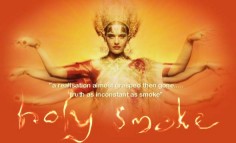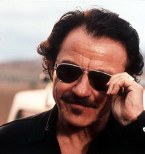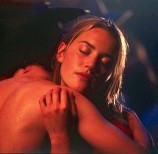|
Holy Smoke!
|
| |
 |
USA,
1999. Not Rated. 120 minutes.
Cast: Kate Winslet, Harvey Keitel,
Pam Grier, Julie Hamilton, Sophie Lee, Daniel Wyllie, Paul Goddard, Tim
Robertson, George Mangos
Writers: Jane Campion, Anne Campion
Music: Angelo Badalamenti
Cinematographer: Dion Beebe
Producer: Jan Chapman
Director: Jane Campion
|
| Grade:
C+ |
Review
by Alison Tweedie-Perry |
 n
all the press on this movie before its initial Oscar-qualifying one-week run
in NY and LA--and even in its entry at the IMDb--it was depicted as titles
for grown-up movies rightfully should be, bereft of emotion-dictating punctuation.
Once it hit theaters, however, the title bore that mark of a must-miss madcap
comedy, the exclamation point. Don't get the impression that I don't feel for
the Miramax marketing folks who had to figure out a way to sell this psycho-sexual-religious-suburban-wilderness-survival-melodrama-with-funny-spots
bit of Kate Winslet idolatry. They had a tough job to do, but somehow, "sexy
comedy" just doesn't nail it.
n
all the press on this movie before its initial Oscar-qualifying one-week run
in NY and LA--and even in its entry at the IMDb--it was depicted as titles
for grown-up movies rightfully should be, bereft of emotion-dictating punctuation.
Once it hit theaters, however, the title bore that mark of a must-miss madcap
comedy, the exclamation point. Don't get the impression that I don't feel for
the Miramax marketing folks who had to figure out a way to sell this psycho-sexual-religious-suburban-wilderness-survival-melodrama-with-funny-spots
bit of Kate Winslet idolatry. They had a tough job to do, but somehow, "sexy
comedy" just doesn't nail it. 
There are a lot of moments set in suburban Sydney that feature the wacky buffoons
who, movies have taught us, occupy Australia. Aside from them, the few zingers
Kate manages to whip off, and her exuberantly joyful sari-clad singalong to
Alanis Morrisette's "You Oughta Know," not much in this movie is funny-ha-ha.
There is, however, plenty that is funny-odd and funny-strange.
The film opens with beautiful shots of Kate Does India, a melange of colors
and textures over which our buxom, rosy-cheeked heroine floats, basking in the
glow of her post-Titanic cinematic world
tour. (The tour began in North Africa with Hideous
Kinky.) These succulent images are incongruously accompanied by a Neil
Diamond tune. It's just the beginning of a slew of distracting incongruities
that, one presumes, are meant to be where the funny comes in.
Kate plays Ruth, a young Australian woman traveling India with her girlfriend,
Pru. At a visit to an ashram to see charismatic-leader Baba, Ruth's eyes
(all twelve of them in a psychedelic kaleidoscope) are opened. She stays
behind in India to follow Baba, while prissy Pru returns to Sydney to inform
Ruth's oh-so-wackily middle-Australian family of what's become of her.
The family reacts as though the world's come to an end, in suitably wacky,
overblown style, and hatches a plan to spring Ruth from the clutches of Baba's
"cult." The urgency is bizarre because, aside from attracting legions of western
hippies and keeping Ruth from Australia, the "cult" doesn't seem as odious as
the family makes out. You can understand a young woman of a spiritually questing
bent taking refuge from the wackiness of Sydney home life to ponder the greater
mysteries with Baba and his followers. 
On the word of an advisor, Ruth's family hires--at great expense--an
American "exit counselor," PJ Waters (Harvey Keitel). Together, the family
and PJ cook up a scheme to lure Ruth back to Australia for "exiting" by
claiming her father is dying. Ruth's mother makes an amusing fish-out-of-water
visit to India, and Ruth agrees to come home to visit her father on his
deathbed at her aunt and uncle's Outback emu farm.
Finally, after all this exposition (which takes up about a third of
the film), we get to what I thought the movie was supposed to be about:
Kate vs. Harvey in a shack in the Outback. This is supposed to be a great
matching of wills and wits, replete with humorous ripostes and dripping
sexual tension. It isn't. The challenges PJ makes to Ruth's faith in Baba
start off strong. Perhaps too strong, because Ruth's beliefs, which were
supposed to be so threatening that her family was willing to foot an enormous
bill for PJ's services, collapse like a house of cards in very short order.
Since the struggle for Ruth's soul is so quickly dispatched, the rest
of the time (for, apparently, the deprogramming process takes three days
even if the disciple repudiates her leader on the first) Ruth tries to
find her personal power, mainly by alternately seducing and rejecting poor
old PJ. The relationship is bizarre. It is clearly a power struggle of
sorts, but the characters' respective motivations and goals are thoroughly
muddled.
Ruth is gorgeous, conceited, confused, and very insecure. PJ is a horndog with
a heart of gold. I guess. There is much superficial hand-wringing on PJ's part
about how he shouldn't be getting involved with Ruth, it's inappropriate in
light of the power imbalance of their relationship, blah, blah, blah. His professional
restraint quickly disintegrates when confronted with the full glory of Ruth's
naked body (and what a naked body it is! All viewers with the slightest affinity
for Ms. Winslet's charms are advised to bring a drool cup). Somehow, when she
starts peeing on herself, the last of PJ's reservations are cast to the Australian
winds. 
The relationship continues, at once escalating and degenerating, reducing
both Ruth and PJ to quivering messes. Their attire grows ever more bizarre,
and their actions ever more inexplicable. By the time Ruth's wacky Australian
relatives reappear, they are suitably shocked that they've poured so much
good money after bad. And so it ends. There is a coda that shows how much
they've learned, which is just ducky for them, but does little to help
lift the audience from the miasmic disorientation the last half-hour of
the film engenders.
It is not at all clear what Jane Campion means to be saying, beyond
that everyone has the capacity to be extremely messed up. Unlike her first
film, Sweetie (which Holy Smoke emulates in its desperately
giddy tone and colorful, hyper-real style more than the more subdued Campion
films, The Piano and Portrait of a Lady), the strong-willed
heroine's confusion doesn't drive the story--and neither does much else.
One press-release description of the film says Ruth and PJ "throw everything
they've got at each other" in their struggle for dominance. It feels more
like Campion and her co-writer, her sister Anne Campion, threw everything
they had into this script to please the widest range of people possible.
They wind up pleasing very few.
Oddly, despite all these negatives, this isn't an unpleasant film to sit through.
There are a few laughs and a couple interesting ideas. The main reason to endure
Holy Smoke, though, is the gorgeous photography of India, of the Outback,
and most especially, of the lushly exquisite Kate Winslet. Her performance is
spectacular--as indeed, it must be to convey the huge range of traits and emotions
with which the Campion sisters have imbued Ruth. Winslet shines so luminously
that even the versatile veteran Keitel seems woefully out of his league. While
that is sort of the point of the story, it doesn't really work.
The other performers are stereotypes or cartoons that hardly rate mention.
Campion also commits a great injustice by placing Pam Grier in the tiniest
of parts as PJ's girlfriend and assistant who appears for all of two scenes.
Holy Smoke is an exercise best left to the most ardent of Kate Winslet
worshippers, who will likely be so enraptured by their heroine, they won't realize
how little sense the movie makes, or they just won't care. Anyone seeking a
feminist take on male-female power struggles, an exploration of the mind's ability
to be swayed by faith, literate sparring filled with sexual tension, or any
other such deep issues, will be sorely disappointed. As for the people Miramax
hopes to lure with its "wacky comedy" punctuation, they should stay as far away
from this film as possible. There is nothing in Holy Smoke that justifies
the exclamation point.
Review © January
2000 by AboutFilm.Com and the author.
Images © 1999
Miramax Films. All Rights Reserved.




